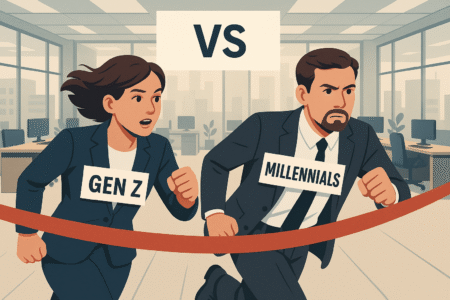The modern office isn’t just about KPIs, Zoom calls, or water cooler chatter anymore. It’s become a quiet battleground — not of job titles or pay grades, but generations. In one corner, we have the Millennials — the side hustle warriors, the burnout romantics. And in the other, Gen Z — the boundary-setting, capitalism-questioning digital natives. What we’re witnessing isn’t just a shift in work culture — it’s a clash of values, vibes, and vocab. The Rise-and-Grind Millennials Born between 1981 and 1996, Millennials came of age during recessions, layoffs, and an economy that taught them one thing: survival means submission. So, they worked. Hard. Overtime was a badge of honor, not a red flag. They worshipped at the altar of hustle culture, turned productivity into identity, and saw their desks as second homes. They believe in loyalty, in climbing the ladder — and yes, in perfecting the art of the passive-aggressive “Just circling back…” email. The Boundaries-First Gen Z Enter Gen Z, born post-1997, into a system already broken — and unapologetically vocal about not fixing it with silence. They watched Millennials get crushed under toxic work norms and said: “No, thanks.” They came armed with therapy-speak, digital fluency, and work-life balance as a non-negotiable. For Gen Z, staying late doesn’t mean dedication — it signals poor management. And if the job doesn’t align with their mental health? They’ll quit on a meme. They communicate with soft language (“no pressure if not :)”) and sharp clarity. They don’t live to work — they work so they can live. Cold War or Culture Clash? The tension between the two isn’t loud. It simmers in Slack threads, sarcastic Instagram reels, and that subtle tone shift in office emails. Millennials think Gen Z lacks grit. Gen Z thinks Millennials glamorize suffering. It’s a silent war of survival vs evolution. Where Millennials endured the system, Gen Z is actively trying to dismantle it. Millennials adapted. Gen Z is disrupting. Lost in Translation This generational divide shows up in language, too: And the miscommunication isn’t just verbal — it’s emotional. Millennials see professionalism as restraint. Gen Z sees it as authenticity. Cue the collaboration breakdowns and passive Slack shade. So… What Now? Let’s be real — this conflict isn’t productive. Because when you zoom out, both generations are fighting the same system. Just with different weapons. Millennials brought us remote work, digital transformation, and the rise of freelancing. Gen Z is bringing us emotional intelligence, cultural accountability, and flexible-first thinking. Put them together? You get a workplace that’s not just functional — but future-ready. Final Thought This isn’t about who’s right. It’s about what’s next. The future of work isn’t generational. It’s intentional. And maybe, just maybe, the office doesn’t need another “OK Boomer” meme or an email about “office culture.” What it really needs is a conversation. So before you roll your eyes at that Gen Z intern who clocks out at 5 sharp — or scoff at that Millennial manager with ten color-coded calendars — pause. Ask a question. Share a story. Start a dialogue. Because the real enemy isn’t each other. It’s a work culture that still confuses exhaustion for excellence. Keep Reading Foramz for your daily dose of moral support.
CONNECTING THOUGHTS

